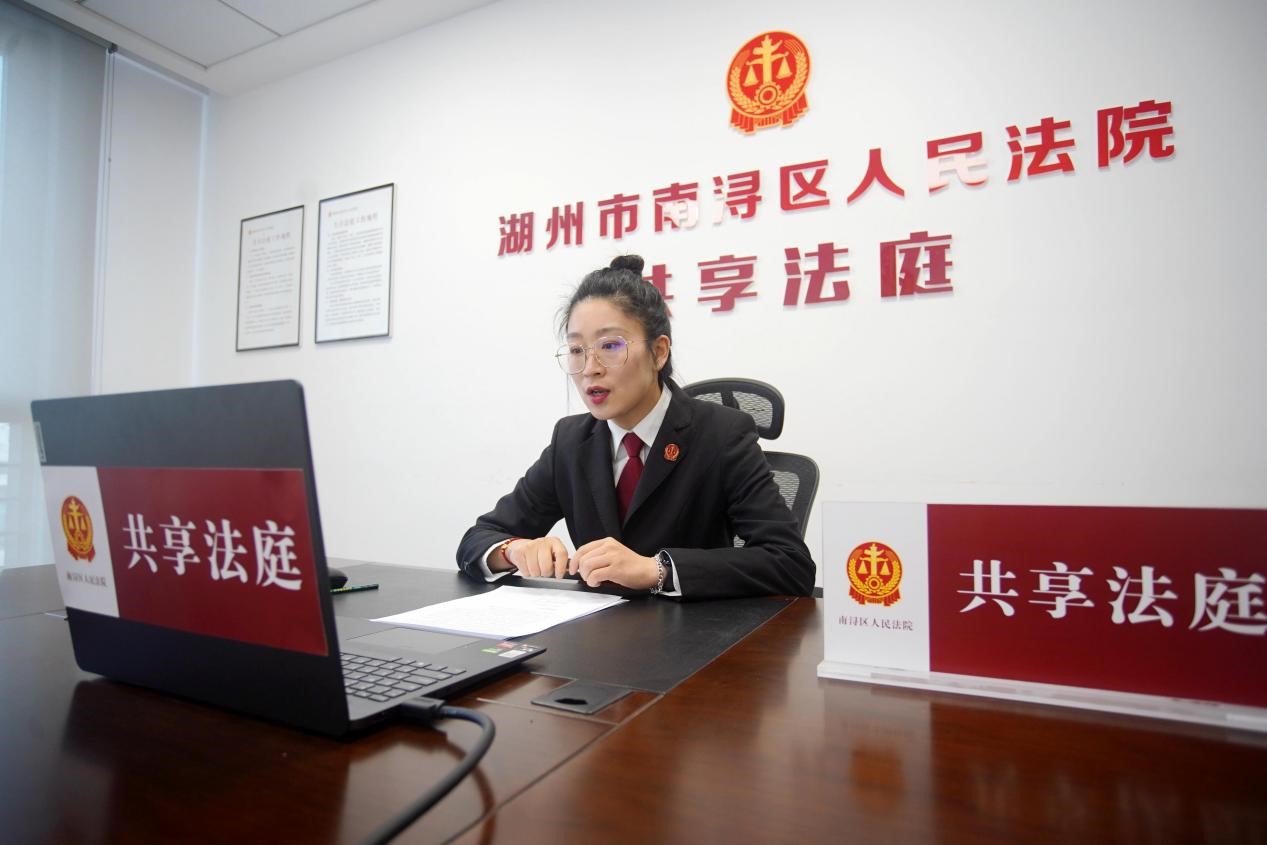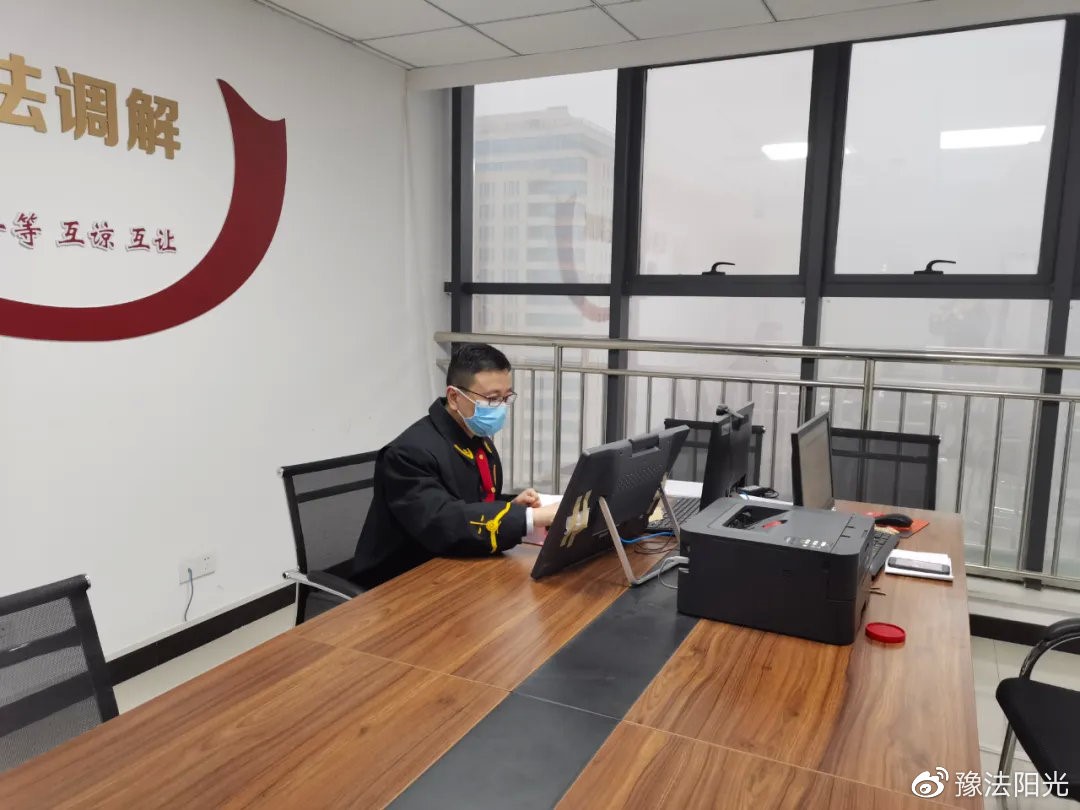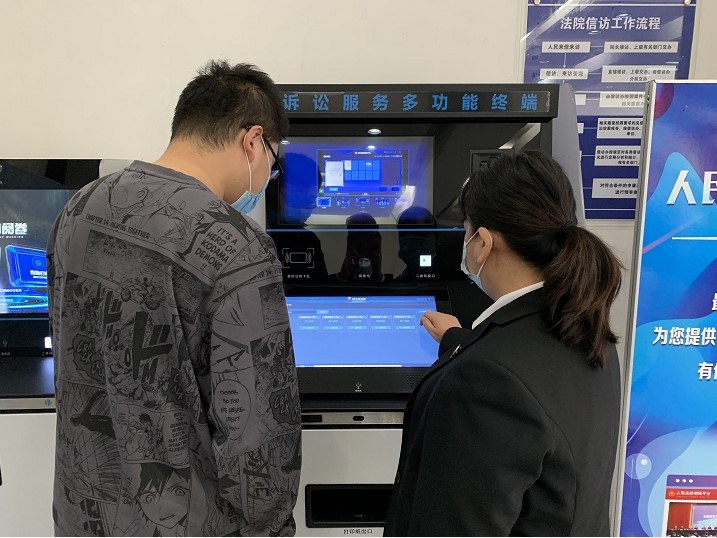Smart courts in China provide efficient, convenient judicial services online
The construction of smart courts in China has picked up speed with the deep integration of blockchain, big data, Internet of Things, artificial intelligence (AI) and other digital technologies into courts’ functions, giving people easier access to judicial services while enabling cases to be handled in a paperless manner.

A judge with the people’s court of Nanxun district, Huzhou city, east China’s Zhejiang province, conducts mediation online, March 2, 2022. (Photo by Zhang Bin/People’s Daily Online)
As smart court construction advances, online handling of cases becomes increasingly common in China. More and more people in the country can now have their disputes resolved through a computer, a mobile phone and a couple of apps without leaving their homes. They can file a lawsuit by logging in certain platforms on their mobile phones, attend court hearings remotely via videoconferencing, and receive electronic judgment documents.
Recently, the court of Tuanlin township under the people’s court of Poyang county, east China’s Jiangxi province, resolved a labor dispute over wage arrears efficiently online. Because the plaintiff and defendant were in two different provinces, the judges presiding over the case moved the court online with both parties’ consent.
After entering information about the case into the online mediation platform of the people’s court, the judges mediated their dispute remotely and helped them reach agreement, and later uploaded the mediation agreement on to the diversified dispute resolution platform of the people’s court for the plaintiff’s and defendant’s signature. Then they sent the signed electronic agreement to the two parties. The entire mediation process was completed in less than one day.
Throughout the process, the plaintiff and defendant completed relevant procedures through their mobile phones, which, according to them, was really convenient and fast.
At present, courts in a large part of China allow online case filing, submission of materials, application for reading case files and court hearings, which greatly benefits judges, lawyers and litigants.
In offline trials, digital technologies are also of great help. For example, courts in Shanghai and other places have adopted blockchain technology to record or videotape court hearings and thus no longer need to print paper court records.
In addition, apps, online platforms and other forms of mobile court functions are also improving.
As COVID-19 infections continue to rise around the world, the importance of smart courts has become more prominent. Online case filing and handling has not only effectively safeguarded people’s safety amid the pandemic, but demonstrated humanistic care in judicial services.
Last year, more than 11.4 million cases were filed online and nearly 1.28 million hearings were held online in China, according to a report on the work of the Supreme People’s Court of China (SPC).
A total of 1.71 billion pieces of evidence were stored on the judicial blockchain, with notable effects on verification and tamper-proofing during the service and storage of electronic evidence; 220 big data reports on economic and social development were formed in Chinese courtrooms, which proved that data-assisted decision-making in the courts can help with social governance; knowledge-as-a-service platforms covering business scenarios such as similar case push notification, credit evaluation and trial supervision provided services for Chinese courts for 140 million times, the report said.
In recent years, the construction of relevant systems and platforms for smart courts has gathered pace in China.
After registering and logging on a WeChat mini-program launched by the SPC, people can find the lawsuits they are involved in and choose a court for online mediation and litigation.
The platform integrates China’s general litigation services and functions including mediation, case filing, case file access, service of legal papers, attachment and authentication with the characteristic services and functions of local people’s courts and is able to meet people’s needs for one-stop online judicial services.

A judge with the people’s court of Weidu district, Xuchang city, central China’s Henan province, hears a civil case via a video conference with agents and litigants, January 2022. (Photo/Official Weibo account of Henan High People’s Court)
Since 2021, three sets of rules released by the SPC on online litigation, mediation and functioning of the people’s courts, respectively, have been officially implemented.
The three sets of rules, which focus on different aspects and coordinate with and complement each other, have formed a trinity system of rules, and are expected to help gradually establish a system of rules on Internet-based judicial services to provide judicial guarantee for digital transformation in the economy and society.
China’s Outline of the 14th Five-Year Plan (2021-2025) for National Economic and Social Development and the Long-Range Objectives through the Year 2035 noted that the country will strengthen smart court construction.
A national meeting attended by presidents of the high people’s courts held in January made arrangements for the work of the people’s courts in 2022, requiring the people’s courts to apply the online trial mechanism reasonably and accurately to protect the parties’ rights to choose and to know. It called on the people’s courts to resolutely abandon the wrong idea that “online trial” equals “simplified trial” and ensured that online litigation reduces costs without compromising on quality and improves efficiency without undermining litigants’ rights.

A staff member with the people’s court of Tonghua county, northeast China’s Jilin province, helps a citizen use litigation service multi-purpose terminal, March 2022. (Photo/chinapeace.gov.cn/)
The people’s courts in China will promote the application of emerging technologies such as 5G, blockchain, and AI to provide intelligent, integrated, and collaborative services for judges and the people. They will also strictly delineate boundaries for technologies and ensure data security so that judicial impartiality and neutrality will not be impaired because of excessive intervention of technologies.
Photos
Related Stories
- Chinese courts pledge iron hand on terrorism, graft
- China to explore establishing transregional courts, procuratorates
- New court rules to boost lawyers' role and dignity
- Chinese courts to publish judgements online
- Chinese courts strengthen coercive implementation of judgement
- Chinese courts hear the public's voices
- Chinese courts deny lobbyists to promote clean judicial system
- Chinese courts more able to prevent ruling evasion: chief justice
- Court mediation solving more civil cases, social conflict: Chinese Chief Justice
- Chinese courts seeking uniform standards for prosecution after controversial penalties
Copyright © 2022 People's Daily Online. All Rights Reserved.










